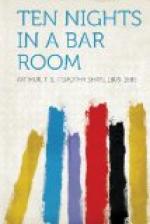Most of those who came in were strangers to me. I was looking from face to face to see if any of the old company were present, when one countenance struck me as familiar. I was studying it, in order, if possible, to identify the person, when some one addressed him as “Judge.”
Changed as the face was, I now recognized it as that of Judge Lyman. Five years had marred that face terribly. It seemed twice the former size; and all its bright expression was gone. The thickened and protruding eyelids half closed the leaden eyes, and the swollen lips and cheeks gave to his countenance a look of all predominating sensuality. True manliness had bowed itself in debasing submission to the bestial. He talked loudly, and with a pompous dogmatism—mainly on political subjects—but talked only from memory; for any one could see, that thought came into but feeble activity. And yet, derationalized, so to speak, as he was, through drink, he had been chosen a representative in Congress, at the previous election, on the anti-temperance ticket, and by a very handsome majority. He was the rum candidate; and the rum interest, aided by the easily swayed “indifferents,” swept aside the claims of law, order, temperance, and good morals; and the district from which he was chosen as a National Legislator sent him up to the National Councils, and said in the act—“Look upon him we have chosen as our representative, and see in him a type of our principles, our quality, and our condition, as a community.”
Judge Lyman, around whom a little circle soon gathered, was very severe on the temperance party, which, for two years, had opposed his election, and which, at the last struggle, showed itself to be a rapidly growing organization. During the canvass, a paper was published by this party, in which his personal habits, character, and moral principles were discussed in the freest manner, and certainly not in a way to elevate him in the estimation of men whose opinion was of any value.
It was not much to be wondered at, that he assumed to think temperance issues at the polls were false issues; and that when temperance men sought to tamper with elections, the liberties of the people were in danger; nor that he pronounced the whole body of temperance men as selfish schemers and canting hypocrites.
“The next thing we will have,” he exclaimed, warming with his theme, and speaking so loud that his voice sounded throughout the room, and arrested every one’s attention, “will be laws to fine any man who takes a chew of tobacco, or lights a cigar. Touch the liberties of the people in the smallest particular, and all guarantees are gone. The Stamp Act, against which our noble forefathers rebelled, was a light measure of oppression to that contemplated by these worse than fanatics.”
“You are right there, judge; right for once in your life, if you (hic) were never right before!” exclaimed a battered-looking specimen of humanity, who stood near the speaker, slapping Judge Lyman on the shoulder familiarly as he spoke. “There’s no telling what they will do. There’s (hic) my old uncle Josh Wilson, who’s been keeper of the Poor-house these ten years. Well, they’re going to turn him out, if ever they get the upper hand in Bolton county.”




